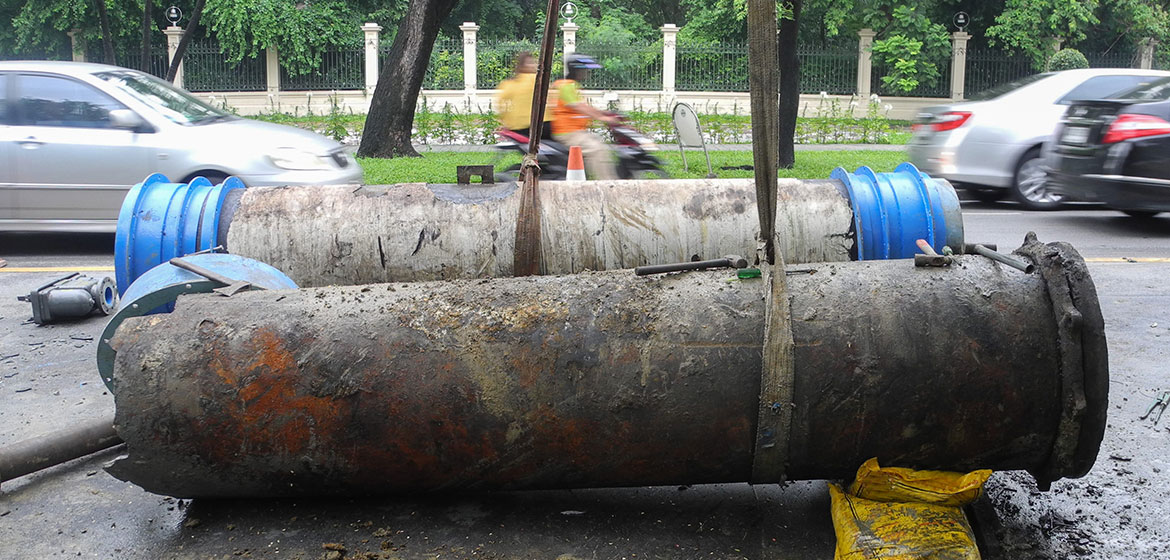Signs You Need To Replace Your Cast Iron Pipes

Depending on the age of your commercial building, your infrastructure may be outdated. What does that mean? The equipment and materials used to construct a building may be susceptible to issues of a surprisingly wide range. As an example, if your building was constructed 20 years ago or more, rather than today’s PVC plumbing, your building may have cast iron pipes. If they haven’t already, they could soon present a problem. It’s best to replace cast iron pipes.
The thing about these kinds of pipes is that they have a very definite lifespan. If the cast-iron pipes in your commercial building fail, you are in for varying degrees of water damage depending on how soon you notice the problem and how severe it is. If you can head off damage before it occurs, all the better.
If damage does occur, and you need to file an insurance claim, make sure you hire a public adjuster rather than depending on the adjuster your insurance company tries to send you. We’ll discuss that, specifically, a bit later on.
Here are some signs that it’s time to replace cast iron pipes.
Pipes That Are Leaking
If, over a long period of time, you’ve experienced a leak or two in your plumbing, it may not be a big deal. If you are experiencing frequent leaks, however, this could point to the system failing. Once an area of cast-iron piping fails, it’s only a matter of time before the rest goes.
Strange Colored Water
Every now and then, it’s a good idea to have tap water tested. In some areas, it’s not uncommon to have yellow or light brown colored water. However, it may be a sign of bad plumbing if you notice unusual water discoloration.
Nasty Odor
People frequently report a nasty odor which smells like rotten eggs from ventilation stacks. That’s normal. It means you no longer have an airtight sewer infrastructure, however, if you detect those odors within your building. Your commercial building’s environment should never be exposed to sewer gas.
Mold Growth
Particularly for those who have respiratory issues, mold is a bad thing to have growing in your commercial building. The combination of cast-iron plumbing and mold is a bad one. Mold production can definitely be triggered by a leaking pipe.
Sewer Backup
Sewage backups can occur in the piping from toilets. Whereas you may think that using chemicals to clear the backup is a good idea, they can actually destroy pipes made from cast-iron.
Green Patches Appearing Suddenly
If you notice, around the trees, plants, lawn, etc. surrounding your commercial building, particular green patches, it could be because sewage is leaking out into the area. To verify the leak, a certified plumber should be called.
Structural Foundation Damage
A potentially expensive and likely dangerous sign of pipe failure is that, in your commercial building foundation, you discover holes and/or cracks. The foundation can be threatened if too much time passes, and leaks go unnoticed.
If Your Cast Iron Pipes Leaked and Damaged Your Commercial Property – Contact Stone Claims
When commercial property damage results from damaged or broken cast iron pipes, you will likely need an insurance adjuster. Rather than relying on the adjuster sent by the insurance company, contact Stone Claims. Why is this so important? It’s all in our motto: Insurance adjusters work for insurance companies. We work for you. We fight for fairness.
The adjuster your insurance company sends will have the insurance company’s interests at heart – not yours. We are ready to serve you, 24 hours a day, seven days a week. We will give you a fair, honest, and expedited commercial property damage insurance adjustment.
Stone Claims is licensed and operates in Delaware, Virginia, Texas, Tennessee, South Carolina, Pennsylvania, Oregon, Colorado, North Carolina, New Jersey, Nebraska, Mississippi, Maryland, Florida, Louisiana, Georgia, and Oklahoma.
For a free claim review, please contact us at 1-800-892-1116. You can email us at office@stoneclaims.com if you like. Or you can use our convenient online form. Fill it out, send it in, and we’ll get back to you.